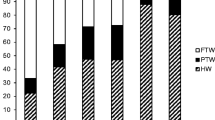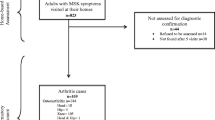Abstract
The aim of the study was to determine household chores and leisure-time activities most affected by rheumatoid arthritis (RA) and to evaluate the perceived impact on performing these activities. Also, our aim was to estimate the required and received assistance for household chores. In an interview study via telephone, 124 patients with moderate-to-severe RA, visiting a tertiary-level dermatological clinic, listed spontaneously without predefined list the household chores and leisure-time activities that they considered were particularly affected by the RA. Ability to perform household chores and leisure-time activities were asked. The need for outside assistance with household chores and help received were also determined. Rheumatoid arthritis affected wide range of everyday household activities, with tasks related to cleaning of the house mentioned most often. Eleven of the categories out of 16 were similar to those included in the HAQ index. The majority of the patients (84.6 %) reported disadvantage in performing household chores because of RA. More than half of the patients (55.7 %) received assistance with household chores, women significantly more often than men (69.0 vs. 26.3 %, p < 0.01). Most of the household chores mentioned were physically demanding. Leisure-time activities listed by respondents as affected by RA were mostly related to sport. The majority of patients (77.2 %) had either reduced or completely given up at least one leisure-time activity. When estimating the total burden of the disease, the impact on both household chores and leisure-time activities should be taken into account.
Similar content being viewed by others
References
Alamanos Y, Voulgari P, Drosos A (2006) Incidence and prevalence of rheumatoid arthritis, based on the 1987 American College of Rheumatology criteria: a systematic review. Semin Arthritis Rheum 36:182–188
Symmons D, Turner G, Webb R, Asten P, Barrett E, Lunt M et al (2002) The prevalence of rheumatoid arthritis in the United Kingdom: new estimates for a new century. Rheumatology 41:793–800
Helmick C, Felson D, Lawrence R, Gabriel S, Hirsch R, Kwoh C et al (2008) National Arthritis Data Workgroup. Estimates of the prevalence of arthritis and other rheumatic conditions in the United States. Part I. Arthritis Rheum 58:15–25
Cutolo M, Kitas G, van Riel P (2014) Burden of disease in treated rheumatoid arthritis patients: going beyond the joint. Semin Arthritis Rheum 43:479–488
Tuominen R, Tuominen S, Suominen C, Möttönen T, Azbel M, Hemmilä J (2010) Perceived functional disabilities among rheumatoid arthritis patients. Rheumatol Int 30:643–649
Strand V, Singh J (2010) Newer biological agents in rheumatoid arthritis: impact on health-related quality of life and productivity. Drugs 70:121–145
Salaffi F, Carotti M, Gasparini S, Intorcia M, Grassi W (2009) The health-related quality of life in rheumatoid arthritis, ankylosing spondylitis, and psoriatic arthritis: a comparison with a selected sample of healthy people. Health Qual Life Outcomes 7:25
Belza B (1995) Comparison of self-reported fatigue in rheumatoid arthritis and controls. J Rheumatol 22:639–643
Mancuso C, Rincon M, Sayles W, Paget S (2006) Psychosocial variables and fatigue: a longitudinal study comparing individuals with rheumatoid arthritis and healthy controls. J Rheumatol 33:1496–1502
Power J, Badley E, French M, Wall A, Hawker G (2008) Fatigue in osteoarthritis: a qualitative study. BMC Musculoskelet Disord 9:63
Eberhardt K, Larsson BM, Nived K (1993) Early rheumatoid arthritis–some social, economical, and psychological aspects. Scand J Rheumatol 22:119–123
Strand V, Khanna D (2010) The impact of rheumatoid arthritis and treatment on patients’ lives. Clin Exp Rheumatol 28:32–40
Reinseth L, Uhlig T, Kjeken I, Koksvik H, Skomsvoll J, Espnes G (2011) Performance in leisure-time physical activities and self-efficacy in females with rheumatoid arthritis. Scand J Occup Ther 18:210–218
Sverker A, Ostlund G, Thyberg M, Thyberg I, Valtersson E, Björk M (2014) Dilemmas of participation in everyday life in early rheumatoid arthritis: a qualitative interview study (The Swedish TIRA Project). Disabil Rehabil 22:1–9
Fex E, Larsson B, Nived K, Eberhardt K (1998) Effect of rheumatoid arthritis on work status and social and leisure time activities in patients followed 8 years from onset. J Rheumatol 25:44–50
Bruce B, Fries J (2005) The Health Assessment Questionnaire (HAQ). Clin Exp Rheumatol 23:14–18
Fries J, Spitz P, Kraines R, Holman H (1980) Measurement of patient outcome in arthritis. Arthritis Rheum 23:137–145
Tugwell P, Bombardier C, Buchanan W, Goldsmith C, Grace E, Hanna B (1987) The MACTAR Patient Preference Disability Questionnaire—an individualized functional priority approach for assessing improvement in physical disability in clinical trials in rheumatoid arthritis. J Rheumatol 14:446–451
Strand C, Crawford B (2007) Longterm treatment benefits are best reflected by patient reported outcomes. J Rheumatol 34:2317–2319
Sprangers M, de Regt E, Andries F, van Agt H, Bijl R, de Boer J et al (2000) Which chronic conditions are associated with better or poorer quality of life? J Clin Epidemiol 53:895–907
Kirwan J, Hewlett S, Heiberg T, Hughes R, Carr M, Hehir M et al (2005) Incorporating the patient perspective into outcome assessment in rheumatoid arthritis–progress at OMERACT 7. J Rheumatol 32:2250–2256
Mattila K, Leino M, Kemppi C, Tuominen R (2011) Perceived disadvantages caused by low back pain. J Rehabil Med 43:684–688
Allaire S, Meenan R, Anderson J (1991) The impact of rheumatoid arthritis on the household work performance of women. Arthritis Rheum 34:669–678
Habib G, Artul S, Ratson N, Froom P (2007) Household work disability of Arab housewives with rheumatoid arthritis. Clin Rheumatol 26:759–763
Maetzel A, Li L, Pencharz J, Tomlinson G, Bombardier C (2004) The economic burden associated with osteoarthritis, rheumatoid arthritis, and hypertension: a comparative study. Ann Rheum Dis 63:395–401
Katz P, Morris A, Gregorich S, Yazdany J, Eisner M, Yelin E et al (2009) Valued life activity disability played a significant role in self-rated health among adults with chronic health conditions. J Clin Epidemiol 62:158–166
Katz P, Yelin E (2001) Activity loss and the onset of depressive symptoms: do some activities matter more than others? Arthritis Rheum 44:1194–1202
Squire R (2012) Living well with rheumatoid arthritis. Musculoscelet Care 10:127–134
Leino M, Mustonen A, Mattila K, Koulu L, Tuominen R (2014) Perceived impact of psoriasis on leisure-time activities. Eur J Dermatol 24:224–228
Pincus T, Summey J, Soraci S, Wallston K, Hummon N (1983) Assessment of patient satisfaction in activities of daily living using a modified Stanford Health Assessment Questionnaire. Arthritis Rheum 26:1346–1353
Pincus T, Swearingen C, Wolfe F (1999) Toward a multidimensional Health Assessment Questionnaire (MDHAQ): assessment of advanced activities of daily living and psychological status in the patient-friendly health assessment questionnaire format. Arthritis Rheum 42:2220–2230
Yazici Y, Bergman M, Pincus T (2008) Time to score quantitative rheumatoid arthritis measures: 28-joint count, disease activity score, health assessment questionnaire (HAQ), multidimensional HAQ (MDHAQ), and routine assessment of patient index data (RAPID) scores. J Rheumatol 35:603–609
Wolfe F (2001) Which HAQ is best? A comparison of the HAQ, MHAQ and RA-HAQ, a difficult 8 item HAQ (DHAQ), and a rescored 20 item HAQ (HAQ20): analyses in 2491 rheumatoid arthritis patients following leflunomide initiation. J Rheumatol 28:982–989
Mason J, Anderson J, Meenan R (1988) A model of health status for rheumatoid arthritis. A factor analysis of the Arthritis Impact Measurement Scales. Arthritis Rheum 31:714–720
Wolfe F (2000) A reappraisal of HAQ disability in rheumatoid arthritis. Arthritis Rheum 43:2751–2761
Sokka T, Kautiainen H, Hannonen P, Pincus T (2006) Changes in Health Assessment Questionnaire disability scores over 5 years in patients with rheumatoid arthritis compared with the general population. Arthritis Rheum 54:3113–3118
Carr A, Hewlett S, Hughes R, Mitchell H, Ryan S, Carr M et al (2003) Rheumatology outcomes: the patient’s perspective. J Rheumatol 30:880–883
Verhoeven A, Boers M, van der Liden S (2000) Validity of the MACTAR questionnaire as a functional index in a rheumatoid arthritis clinical trial. The McMaster Toronto Arthritis. J Rheumatol 27:2801–2809
Hewlett S, Smith AP, Kirwan JR (2001) Values for function in rheumatoid arthritis: patients, professionals, and public. Ann Rheum Dis 60:928–933
van den Berg M, de Boer I, le Cessie S, Breedveld F, Vliet Vlieland T (2007) Most people with rheumatoid arthritis undertake leisure-time physical activity in the Netherlands: an observational study. Aust J Physiother 53:113–118
Cunha-Miranda L, Costa L, Ribeiro J (2010) NEAR study: needs and Expectations in Rheumatoid Arthritis—do we know our patients needs? Acta Reumatol Port 35:314–323
Acknowledgments
This study was supported by unconditional grants from the research funds of the Hospital District of Southwest Finland.
Conflict of interest
The authors declare that they have no conflict of interest.
Ethical standard
All named authors meet the ICMJE criteria for authorship for this manuscript, take responsibility for the integrity of the work as a whole, and have given final approval to the version to be published. The ethical committee of the Hospital District of Southwest Finland approved the study, and the sampled subjects received a written description of the sampling, study purposes, planned use, and storage of the information they were to provide. All procedures followed were in accordance with the ethical standards of the responsible committee on human experimentation (institutional and national) and with the Declaration of Helsinki 1975, as revised in 2000 and 2008.
Informed consent
Informed consent was obtained from all patients for being included in the study.
Author information
Authors and Affiliations
Corresponding author
Rights and permissions
About this article
Cite this article
Leino, M., Tuominen, S., Pirilä, L. et al. Effects of rheumatoid arthritis on household chores and leisure-time activities. Rheumatol Int 35, 1881–1888 (2015). https://doi.org/10.1007/s00296-015-3313-2
Received:
Accepted:
Published:
Issue Date:
DOI: https://doi.org/10.1007/s00296-015-3313-2




